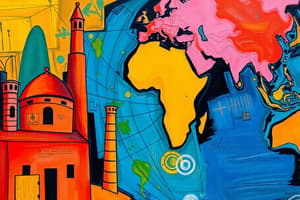Podcast
Questions and Answers
Han Vansh ne kis kshetra mein mahatvapurn vikas dekha?
Han Vansh ne kis kshetra mein mahatvapurn vikas dekha?
- Kala mein
- Vigyan mein (correct)
- Rajneeti mein
- Sanskriti mein
Bharat me aaj jo ganit ki mool siddhant hai, usmein Misr ka yogdan kya hai?
Bharat me aaj jo ganit ki mool siddhant hai, usmein Misr ka yogdan kya hai?
- Pratyek vikalp galat hai.
- Vibhajan evam jyamitiya ke liye adhar sthapit kiya.
- Vikalp a aur c sahi hai. (correct)
- Ganitik siddhanton ko prarambhik roop se prastut kiya.
Greece ke Golden Age mein kaunsi mahatvapurn chijen janm li?
Greece ke Golden Age mein kaunsi mahatvapurn chijen janm li?
- Jeev vigyan aur aushadhi vigyan
- Rajneeti aur arthashastra
- Sanskruti aur kala (correct)
- Itihas aur darshan
Mesopotamia ka kon sa yogdan aaj tak bhugol mein mahatva purn raha hai?
Mesopotamia ka kon sa yogdan aaj tak bhugol mein mahatva purn raha hai?
किस युग में तकनीकी नवाचार ने औद्योगिकरण की गति को तेजी से बढ़ाया?
किस युग में तकनीकी नवाचार ने औद्योगिकरण की गति को तेजी से बढ़ाया?
किस आधुनिक आविष्कार ने पानी की मिलों को क्रमश: दस गुना अधिक प्रभावी बनाया?
किस आधुनिक आविष्कार ने पानी की मिलों को क्रमश: दस गुना अधिक प्रभावी बनाया?
कोन से साम्राज्यों के मध्य 'पहले विश्व युद्ध' में महत्वपूर्ण संधि हुई?
कोन से साम्राज्यों के मध्य 'पहले विश्व युद्ध' में महत्वपूर्ण संधि हुई?
कौन-कौन से महायुद्धों में परमाणु-बम और पूर्व-परमाणु हस्तक्षेप अत्यंत हानिकारक साधनों का प्रदर्शन हुआ?
कौन-कौन से महायुद्धों में परमाणु-बम और पूर्व-परमाणु हस्तक्षेप अत्यंत हानिकारक साधनों का प्रदर्शन हुआ?
पहले प्रमुख परमाणु संघर्ष के परिणामस्वरूप कौन-कौन से सिद्धांतों को स्थाई मतलब मिला?
पहले प्रमुख परमाणु संघर्ष के परिणामस्वरूप कौन-कौन से सिद्धांतों को स्थाई मतलब मिला?
Flashcards are hidden until you start studying
Study Notes
Unraveling History's Tapestry
Delve into humanity's past through four pivotal periods—the rise and fall of ancient civilizations, the industrial transformation, global conflicts, and the journey towards freedom.
Ancient Civilizations
The cradle of human civilization is dotted with stories of ingenuity and resilience. From Mesopotamia's Sumerians and Egypt's pharaohs to China's Han dynasty and Greece's philosophers, each culture contributed unique perspectives and innovations to our world.
-
Sumerians were among the first literate societies who developed cuneiform writing to document their accomplishments and daily life. Their knowledge of astronomy led them to create calendars and establish cities based upon solar observations, setting precedence for future civilizations.
-
Egypt was one of the earliest civilizations to develop agriculture, engineering feats such as irrigation systems and pyramids. Egyptian mathematics also laid foundational principles for multiplication, division, and geometry.
-
China's Han Empire saw significant developments across various fields like architecture, literature, philosophy, warfare strategy, and ironworking. For example, Chinese astronomers discovered sunspots around 150 BC, making crucial contributions to astronomy.
-
Greece, particularly Athens during its Golden Age, gave birth to democracy, philosophy, drama, history, science, biology, and medicine as we know them today. These advancements fostered critical thinking and rationalism within Western society, influencing future developments throughout history.
Industrial Revolution
Beginning in Britain, this period introduced unprecedented changes to manufacturing processes, transportation, communication, and social organization.
-
Improved agricultural techniques and population growth set off an economic boom leading to increased productivity. This newfound abundance lowered food prices, benefiting working-class individuals while raising concerns regarding labor rights.
-
Technological innovation accelerated industrialization. James Watt's steam engine revolutionized water mills, increasing efficiency tenfold and facilitating mass production. Another notable invention of this period was Eli Whitney's cotton gin, which improved textile processing by separating fibers from seeds efficiently.
World Wars
Two monumental conflicts shook the globe during the early twentieth century, catalyzing political change, technological leaps, and widespread loss of life.
-
World War I began in 1914 due to alliances between European nations, colonial rivalries, and nationalistic fervor. It resulted in over eight million deaths, drastically changing Europe's landscape politically and socially. Emerging superpowers, including the United States and Soviet Russia, shaped international relations for decades following this conflict.
-
World War II erupted two decades later, showcasing even more destructive weaponry like nuclear bombs and advanced military tactics. This tragic event brought enduring meaning to concepts such as genocide, the Holocaust, the Red Army, and the Allied powers. The postwar era ushered forth a new bipolar balance of power markedly different from the prewar status quo.
Freedom of India
India's arduous quest for self-determination culminated in independence from British rule in 1947. With influential leaders like Gandhi and Nehru championing nonviolent resistance, Indian citizens embraced peaceful means to secure their sovereignty.
-
Mahatma Gandhi galvanized masses through symbolic acts like dressing only in homespun cloth (khadi) and fasting against ethnic violence. His dedication to truth and justice inspired millions worldwide, earning him admiration beyond borders.
-
Jawaharlal Nehru, India's first prime minister after independence, envisioned creating a modern yet uniquely Indian nation. He advocated for strong democracy, secularism, and socialist reforms aiming to uplift neglected segments of society. As his government endeavored to carve out India's identity amidst Cold War tensions, Nehru played a vital role in shaping India's foreign policy.
Studying That Suits You
Use AI to generate personalized quizzes and flashcards to suit your learning preferences.




